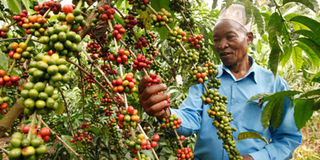Kahakaira adds value to coffee, earns more

Mustafah Kahakaira admires his ripe coffee beans which are ready for harvesting. PHOTO BY Rachel Mabala
What you need to know:
- Farmers in western Uganda are making more money after adding value to their coffee, writes FRED MUZAALE.
It is a hot sunny afternoon in Nyamabaare village, Kyabugimbi Sub-county in Bushenyi District.
Under the scorching sun, an elderly slender man, wearing green gumboots, sweats profusely, as he removes extra branches from a coffee tree in what seems to be a well-tended after coffee plantation. The three-acre coffee plantation belongs to Mustafa Kahakaira.
The plantation is also inter-cropped with bananas at a spacing of five by five metres.
“I’m a commercial coffee farmer and at the same time the chairperson, Rwebijunjure Kwetungura Co-operative society, a primary coffee society with a membership of 3,400 coffee farmers,” he says.
This co-operative society is one of the 19 primary cooperative societies under, Ankole Coffee Producers Cooperative Union Ltd (ACPCU).
Its current total membership stands at 8,000 coffee farmers.
The 78-year-old, says he has been growing Robusta coffee since 1980.
He says he began with an acre of coffee plantation and sold his coffee to Banyankole Kweterana Co-operative Union Ltd, until it collapsed in 1987.
After its collapse, he continued growing coffee; however, he resorted to selling unprocessed coffee to middlemen, whom he says, used to cheat him by giving him low prices.
Also, he lacked extension services, which resulted into low yields. For instance, he notes, from the one acre, then, he was harvesting an average of about 500 kilogrammes of coffee beans per season, which was very low compared to what he harvests today.
Turning point
In 1990, Kahakaira and other coffee farmers in Kyabugimbi Sub-county formed Rwebijunjure Kwetunga Cooperative society. Upon its formation, they registered it and joined ACPCU.
Among their aspirations, as to get better prices for their coffee and also get access to crop finance (loans) from the union.
Kahakaira says since his and other farmers’ coffee trees had been attacked by the coffee wilt disease, ACPCU gave them free Robusta seedlings.
He planted them in three acres. “ACPCU offered us extension workers who took us through the best practices such as planting and fertiliser application,” Kahakaira says.
He says it is recommended that bananas are not planted at the same time with coffee because the bananas grow faster and suffocate the coffee with its broad leaves.
He adds that he is provided with certified fertilisers which he uses in his plantation. However, he also applies coffee husks as manure in his plantation.
Because of the proper agronomy practices, Kahakaira says he now harvests an average of 7,000 kilogrammes of coffee beans per season from his three acres.
To earn more from the coffee, Kahakaira and other members of his society process the coffee and then sell it to ACPCU.
They are paid Shs6,200 per kilogramme compared to Shs3,000 if they had sold unprocessed coffee.
From both seasons last year, Kahakaira says he earned about Shs70m from selling processed coffee.
The General Manager ACPCU, John Nuwagaba says, by providing extension services to member farmers, coffee production has both increased and improved.
This, however, Nuwagaba says, is possible because of the intervention they received from Agricultural Business Initiative (aBi) in 2012.
“aBi intervention enabled us to buy machinery, which has increased our coffee exports, operational efficiency, hence our turnover is Shs8bn,” Nuwagaba says, adding “Besides the money we pay farmers for their coffee, we also give them a bonus or top up. For instance, in the financial year 2016-17 we paid a top up of Shs700m to all farmers.”
Nuwagaba also notes that because they have efficient processing machinery, they are able to ship and deliver their coffee in a timely manner.
He adds that their target is to increase coffee export volume and value from the current 3,000 metric tonnes to 5,000 metric tonnes.
Banana enterprise
The commercial farmer says whereas coffee is a seasonal crop, he earns money every week from selling Matooke. He sells the Matooke to wholesale traders in Bushenyi and Mbarara. Kahakaira says he earns about Shs550,000 from his bananas.
Achievements
Kahakaira says using proceeds from the enterprises; he has been able to pay for his children’s education. Most of his children have completed university.
Also, he has used some of his earnings to build a new permanent house in which he lives with his extended family.
Challenges
Kahakaira’s biggest challenge is the coffee wilt disease which leads to withering of coffee trees.
Because of this, he incurs losses in income and has to inject a lot of money to buy fertilisers to make the trees strong and unsusceptible to the disease.
Additionally, the high cost of labour increases his cost of production, hence cutting the profit margin.
The benefactors
Agricultural Business Initiative (aBi) supports value chain interventions aimed at increasing productivity, improved quality for competitiveness and facilitating market access targeting farmers as the direct beneficiaries. The interventions promoted include, good agricultural practices, post-harvest handling, collective marketing, commercial seed production, sanitary and phyto-sanitary and quality management and entrepreneurship skills and these are limited to six value chains of coffee, oil seeds, maize, pulses, horticulture and dairy.




